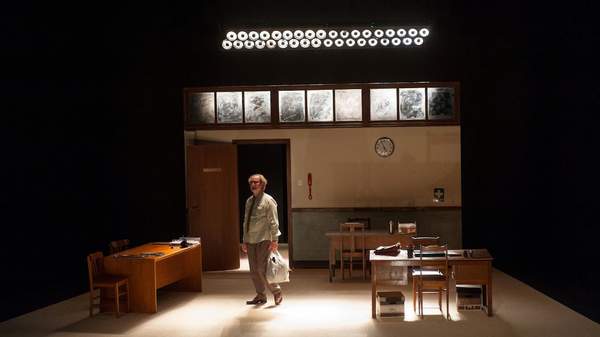Overview
John Doyle (aka Roy Slaven) may never top the artistic triumph that was his co-coverage with HG Nelson of the Sydney Olympics men’s gymnastics, but that doesn’t mean his second play, Vere, isn’t a good runner-up. The memorable terms ‘battered sav’, ‘hello boys’ and ‘crazy date’ have made the world a happier place. With Vere, Doyle has made the world a wiser place. It’s a sensible, heartfelt contribution to the necessary discussion of how to die well.
Vere is a world apart from the tender testes of Russian gymnasts. It follows the mental decline of eminent physicist Vere (Paul Blackwell), after he learns he has a rapidly progressing form of dementia. You can almost smell the mustiness of boffins at their toil in the excellently drab office created by Pip Runciman.
Vere celebrates the last day of semester with his physics colleagues as well as the lecherous vice chancellor, Ralph (Geoff Morrell), and an admiring, nubile female student, Gina (Matilda Bailey). He hands out advice, gifts and wine as he comes to terms with the prospect that he may not be able to travel to the Cern hadron collider to see if his beloved Higgs Boson, or ‘God’ particle, indeed exists.
The second act sees the same cast take on mirror characters from the first act, as we travel to the family home of Vere’s son, Scott (Yalin Ozucelik), whose own son Michael (Matthew Gregan) has decided to marry into a family of religious buffoons. Rebecca Massey makes a particularly fantastic idiot as the wife of a minister. The double casting works well to show Vere’s slipping faculties and the cast takes the opportunity to show off some impressive transformations, each of them embodying very different characters in the two halves.
For a play that cherishes rational humanism, sound designer Steve Francis’ treatment of Delibes’ Flower Duet is positively sentimental. The significance the duet holds as Vere’s late wife’s favourite song is diminished by the version’s closeness to pan-pipes and air freshener commercials. Similarly, Runciman’s multiple doors opening as a metaphor for mental clarity is a bit much.
Doyle’s comedy is interspersed with intellectual tangents, which are mostly at home within the action, though the befuddled-man-of-the-cloth-versus-awe-inspired-scientist construct is not particularly sophisticated. Sarah Goodes has struck a good balance between comedy and intellectual argument with her direction.
The father-son relationship played out so well by Blackman and Ozucelik is the ultimate defence of humanism and the reason the play has an impact. A fine man faces the void in the care of his son who loves and understands him; there’s no afterlife, just the deep respect they have for each other’s minds. It’s pretty great.
Image by Matt Nettheim.
Information
When
Wednesday, November 6, 2013 - Saturday, December 7, 2013
Wednesday, November 6 - Saturday, December 7, 2013
Where
Drama Theatre, Sydney Opera HouseBennelong Point
Sydney
